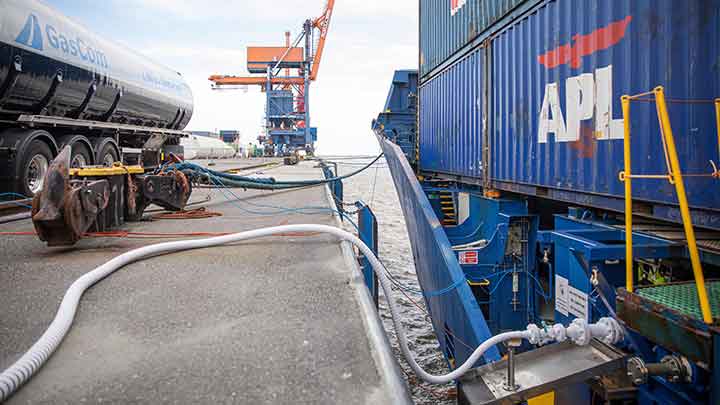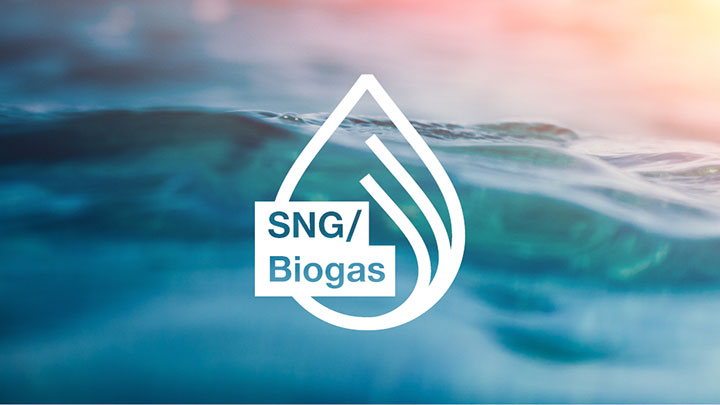SNG: Synthetic gas for the maritime transition

A viable path to decarbonization
MAN Energy Solutions is driving the maritime energy transition with technologies for low-carbon fuels, including green engines and retrofits. Our synthetic natural gas (SNG) solutions offer you a clear path to low-carbon shipping.

From HFO to LNG to SNG
Most of the world's ships run on heavy fuel oil (HFO). The climate crisis has made it essential to find low-carbon alternatives. In recent years, liquefied natural gas (LNG) has become the alternative of choice, but it still a fossil fuel that produces greenhouse gases (GHG). SNG is a new low-carbon alternative. SNG is chemically the same as the main combustible constituent of LNG, so it can used as a direct replacement or blended with LNG, depending on the supply.
SNG as maritime fuel
SNG is optimally suited for the two- and four-stroke dual-fuel engines in MAN’s range and ideal for ships that already run on LNG and aim to save additional emissions. Achieving fuel supply aboard ship is straightforward enough with the right equipment – as with LNG. The new gaseous fuel has to be held at cryogenic temperatures prior to bunkering (-162°C). However, an already established LNG infrastructure can also be used for fueling with SNG.
Reference case: ElbBLUE
World’s first use of SNG in commercial shipping
In September 2021, the 1,036-TEU vessel ElbBLUE, which had been retrofitted with a four-stroke MAN 51/60 dual-fuel engine in 2017, also became the first container ship worldwide to use climate-neutral SNG on a commercial trip. The ship replaced approximately 50% of its bunkered gas fuel with SNG from the Kiwi AG plant in Wertle, Germany. The test proved that any LNG-retrofitted ship can run on carbon-neutral fuels generated by Power-to-X technology.
Read moreManaging Methane Slip
Does the issue of methane slip affect the climate benefits of LNG as an engine fuel for marine applications? Download this paper and find out more about the various countermeasures the company has taken for this purpose.
Synthetic natural gas (SNG) can be derived from fossil fuels and biomass via gasification and methanation processes. SNG can also be produced by, for example, renewable or surplus energy in power-to-gas systems. Biogases are produced from biomass and waste products – and the resulting liquefied fuels can be referred to as BioLNG or LBG (liquefied biogas) and sometimes LBM (liquefied biomethane).
Main advantages:
- SNG and Biogas have the same low NOx, SOx and particulate matter emissions as LNG, but they can be CO2 neutral depending on the feedstock and conversion energy source
- Depending on the source fuel, SNG and Biogas can be a carbon-neutral substitute for fossil fuels
- SNG and Biogas can be blended with LNG to gradually reduce the CO2 footprint
- Considered to be excellent bridging fuels during the ongoing energy transition
Focus areas:
- The availability of SNG and Biogas as bunker fuel
- Increase of production capacities Read more

Solutions / technologies by MAN Energy Solutions:
Two-stroke:
|
|
| Four-stroke: |
|
| Cryogenic equipment |
|
Other future fuels
Related news
MAN PrimeServ to Offer Methanol Retrofits for Four-Stroke MAN engines from 2025
MAN PrimeServ – the after-sales brand of MAN Energy Solutions – has announced that, from 2025, it will offer a retrofit package for the conversion of conventional MAN four-stroke engines already in the field to dual-fuel methanol operation. Customers will initially be able to convert existing MAN 48/60 engines to the latest MAN 51/60R-DF-M engine type with methanol capability.
MAN Energy Solutions reports that the conversion package has been under development for some time and has been tested intensively at its Augsburg, Germany plant since summer 2024. MAN PrimeServ plans to convert the first four-stroke engines for a pilot customer in autumn 2025, at which stage the package will be made available to the general market.
Stefan Eefting, Head of MAN PrimeServ Germany, said: “Climate-neutral shipping can only be achieved with synthetic fuels and green methanol is particularly suitable for four-stroke applications due to its favourable energy-density. In this context, we have already received a large number of retrofit enquiries from customers who want to switch to methanol. With our new methanol-retrofit package, we can now offer customers an economically attractive opportunity to convert older engines to a future-proof type. In this way, we are protecting the climate together with our customers and ensure that their investments in our engines remain future-proof, with a very interesting ROI."
Alexander Knafl, Head of Engineering R&D Four-Stroke at MAN Energy Solutions, added: “We have already gained extensive experience in methanol operation with the MAN 51/60R-DF-M in a series of tests. We have achieved pleasing results in both combustion management and methanol injection and are now focusing on further optimisation. Our aim is to ensure a consistently high engine efficiency, regardless of the fuel type, diesel or methanol.”
Methanol retrofit is economically attractive
Accordingly, from 2025, customers will be able to have conventional MAN 48/60 engines converted to new MAN 51/60R-DF-M engines – both with or without a common-rail system. In addition to the converted engine's methanol capability, customers will also benefit from the engines’ significantly higher efficiency during diesel operation. The engines will also be equipped with the latest control and safety systems from MAN Energy Solutions.
Bernd Siebert, Head of Retrofits & Upgrades, MAN PrimeServ, added: “Converting existing engines to dual-fuel operation with synthetic fuels is of crucial importance to climate-neutral shipping. In addition to new engines, we also need concepts to decarbonise the existing fleet. After all, ships have a service life of 20 to 30 years and, from an economic point of view, retrofitting is also much more efficient than installing a new engine or building a new ship.”
Documents
-
MAN_ES_PM_Methanol-Retrofit_ENG
Contact
Jan Hoppe
Head of Group Communication & Marketing
Group Communications & MarketingMAN Energy Solutions SEStadtbachstr. 186153 AugsburgGermany
Jan.Hoppe@man-es.com t +49 821 322 3126Available languages
- DE ·
- EN
